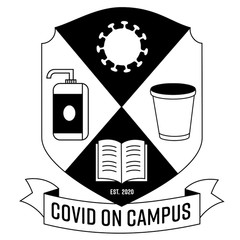John Marino via Flickr
To abide by New York state’s current COVID-19 travel advisory, Syracuse University is requiring all students from states experiencing outbreaks to quarantine for two weeks before arriving on campus. A limited number of freshman and first-year transfer students can pay $1,000 to quarantine in on-campus housing, and students who live in off-campus apartments are able to quarantine there.Otherwise, the school expects returning students to find and pay for quarantine arrangements on their own (CARES Act emergency funding is available to eligible students who’ve filled out a FAFSA). Some of the suitable options for quarantine housing, mentioned in the past few weeks by school officials, include hotel rooms or tents, if students feel like camping somewhere in New York, or in another state that isn’t on New York’s long travel advisory list. The state requires anyone quarantining to have their own room and bathroom, and to stay wherever they’re living for two weeks without going out at all.Dozens of colleges throughout the northeast are opening their campuses for in-person classes this fall, at least in some capacity, despite the ongoing pandemic in the United States. In order to follow state travel advisories, all students traveling to these reopened schools will have to complete 14-day quarantines before classes start. Most schools, like the University of Massachusetts at Amherst, New York University, Cornell University and Rochester University, are letting students quarantine in campus housing for no extra charge before the semester starts in late August, even providing delivered meals and snacks. But others, including Syracuse, are leaving students traveling across the country to campus to figure out quarantine for themselves, and on their own dimes.Syracuse’s most generous offer is a list of nearby hotels that are giving students discounted nightly rates. The least expensive option is a Holiday Inn Express attached to an airport, for $45 per night, or $630 for the full two weeks; most of the discounted rates are between $60–90 per night. This also isn’t the only new financial burden on Syracuse students this year: Like countless other colleges around the country, the university raised tuition by nearly four percent for all full-time undergraduates, starting this fall.The New York state travel advisory is out of Syracuse’s hands, but, as clearly demonstrated by the majority of other schools doing so, it’s extremely within Syracuse’s capabilities to help students shoulder some of the associated costs. (Syracuse has a nearly $1.4 billion endowment, and the increased tuition rate is $54,270 per year.) “Students feel it’s unfair that tuition is going up for an accelerated semester, and to have students pay for hotels, at last minute notice, is raising a lot of concern,” Justine Hastings, rising senior and president of the Syracuse Student Association, said. “It’s overwhelming, and it’s not entirely supportive of students.”On top of these costs and the general stress of going back to school during a global pandemic, Syracuse, like a majority of reopening campuses, requires students to submit proof of a negative COVID-19 test result before returning. Students are able to use testing services where they live, or can pay $49 for a school-sponsored, at-home test. Regular testing will be integral to coming back to in-person classes across the country, as millions of students travel around here and there to be packed into classrooms. Some schools, like Texas A&M, the largest university in the country, are making that responsibility easier by offering tests for free, while others will charge ranging fees.The hoops students have to jump through to return to campus as safely as possible, with still no guarantee against a semester-halting outbreak, seem like a good indicator that perhaps we shouldn’t be doing any of this at all. According to data compiled by the Chronicle of Higher Education, most schools still haven’t determined a fall 2020 plan, and more than 20 percent are planning on fully in-person semesters.While returning to campus isn’t required for students across the board, they do not have access to the full slate of services they are ostensibly paying for, unless they find a way to get back to campus. Syracuse is going ahead with a hybrid plan, offering some classes in-person and others online. In its campus safety plan, Syracuse acknowledged that professors are preparing to teach fully online, and most student schedules consist of a hybrid of online and in-person classes.Syracuse didn’t respond to questions sent from VICE, and has declined to answer, in previous news coverage, what percentage of courses will be taught online-only. The school seems intent on offering at least some degree of in-person education, despite the risks of an outbreak that would affect not just students and faculty, but the surrounding communities and student families.Syracuse was one of more than 100 schools to be hit with lawsuits from students after it abruptly canceled the spring 2020 semester, where students claimed the online classes were of a lesser quality than what they had paid for. The hellbent intention to rush students through on-campus semesters, with shortened schedules, weekends classes, and rules about travel and socializing (Syracuse is encouraging students to sign a “Stay Safe pledge”), could stem from fear of losing tuition money, and another rash of lawsuits by dissatisfied students.Bringing athletes back to campus for workouts and practices has already proven to be a failed experiment, with hundreds of players testing positive since early June, and several teams in complete quarantine as a result of outbreaks. Schools are under no obligation to report their coronavirus case numbers as public information, but a recent New York Times survey of colleges across the country showed hundreds of cases tied to campuses in almost every state.Most fall semesters are slated to start in late August and early September, meaning students who will have to quarantine for two weeks are running out of time to make their way to campus, or at least to the state where their school is located. The entire pandemic has been an experience in “rapidly evolving information,” and the return to school is no exception.“This is probably the definition of a cluster,” Ryan Golden, rising senior and vice president of the Syracuse Student Association, told VICE. We can’t imagine how this is going to work, especially with move-in coming in a few weeks.”Golden said he’s primarily worried about the first three weeks that students are back on campus. “After the first three weeks, if we’re fine, we should be able to stay fine,” he said. In the case of an outbreak, Syracuse has 200 housing units dedicated to quarantine and isolation. If more than 100 students test positive at any point in the semester, the school will go immediately into shelter-in-place. Hastings said she and other students are also very worried about the 200 units; an outbreak or exposure level exceeding that number would essentially be out of the school’s hands.The only safe prediction to make about the next few months is that they will almost certainly be a giant mess. The pandemic continues to surge and outbreaks tied to college parties are increasingly reported, and school has yet to actually start. Universities, with a full picture of the situation at hand, are still barreling ahead, dragging millions of students, as well as their families and communities, right along with them.Correction: This story originally stated that Smith College was charging additional housing fees to students quarantining on campus. Smith College is allowing students to quarantine in campus housing for no extra charge. We regret the error.Follow Hannah Smothers on Twitter.
Advertisement
VICE is continuing to report on college during the COVID-19 pandemic. If you have information you would like to share about how your school is handling classes this year, you can reach the reporter directly at hannah.smothers@vice.com, hannahsmothers@protonmail.com, or securely via Signal at +1 (908) 485-7021.
Advertisement
Advertisement
Advertisement

